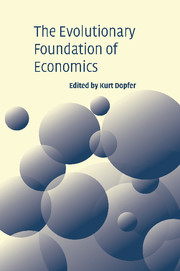Book contents
- Frontmatter
- Contents
- List of contributors
- List of figures
- List of tables
- Prolegomenon
- I Ontological foundations
- II A framework for evolutionary analysis
- 8 Towards an evolutionary theory of production
- 9 Learning in evolutionary environments
- 10 The evolutionary perspective on organizational change and the theory of the firm
- 11 The self-organizational perspective on economic evolution: a unifying paradigm
- 12 Evolutionary concepts in relation to evolutionary economics
- 13 Understanding social and economic systems as evolutionary complex systems
- 14 Perspectives on technological evolution
- 15 Evolutionary economic dynamics: persistent cycles, disruptive technology and the trade-off between stability and complexity
- 16 Evolutionary theorizing on economic growth
- Index of topics
- Index of names
- References
9 - Learning in evolutionary environments
Published online by Cambridge University Press: 22 September 2009
- Frontmatter
- Contents
- List of contributors
- List of figures
- List of tables
- Prolegomenon
- I Ontological foundations
- II A framework for evolutionary analysis
- 8 Towards an evolutionary theory of production
- 9 Learning in evolutionary environments
- 10 The evolutionary perspective on organizational change and the theory of the firm
- 11 The self-organizational perspective on economic evolution: a unifying paradigm
- 12 Evolutionary concepts in relation to evolutionary economics
- 13 Understanding social and economic systems as evolutionary complex systems
- 14 Perspectives on technological evolution
- 15 Evolutionary economic dynamics: persistent cycles, disruptive technology and the trade-off between stability and complexity
- 16 Evolutionary theorizing on economic growth
- Index of topics
- Index of names
- References
Summary
Introduction
In the most generic terms, learning may occur in all circumstances when agents have an imperfect understanding of the world in which they operate – either due to lack of information about it, or, more fundamentally, because of an imprecise knowledge of its structure; or when they master only a limited repertoire of actions in order to cope with whatever problem they face – as compared to the set of actions that an omniscient observer would be able to conceive of; or, finally, when they have only a blurred and changing understanding of what their goals and preferences are.
It is straightforward that learning, so defined, is a ubiquitous characteristic of most economic and – generally – social environments, with the remarkable exception of those postulated by the most extreme forms of economic modelling, such as those assuming rational expectations (RE) or canonical game-theoretic equilibria. But, even in the latter cases (and neglecting any issues about the empirical realism of the underlying assumptions), it is natural to ask how agents learned in the first place about – for example – the ‘true model’ of the world in an RE set-up, or the extensive form of a particular game. And, moreover, in the widespread case of multiple equilibria, how do agents select among them (i.e. how do they learn how to converge onto one of them)?
- Type
- Chapter
- Information
- The Evolutionary Foundations of Economics , pp. 255 - 338Publisher: Cambridge University PressPrint publication year: 2005
References
- 33
- Cited by

